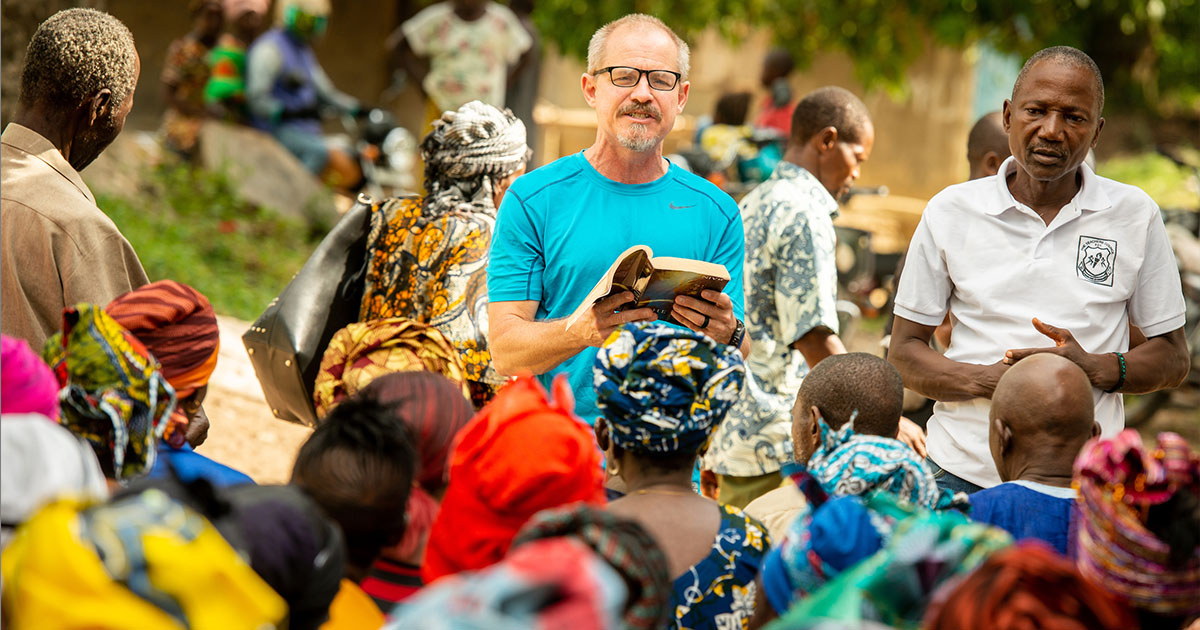
By Pamela Nielsen
“And now, Lord, look upon their threats and grant to your servants to continue to speak your word with all boldness.” (Acts 4:29)
These words, included in Rev. Gary Schulte’s presentation to the June 6–7 meeting of The Lutheran Church—Missouri Synod (LCMS) Board for International Mission (BIM), proved to be a fitting theme for the board’s entire time together as it considered a host of challenges and opportunities for sharing the Gospel throughout the world.
Schulte, regional director for LCMS West & Central Africa, reviewed LCMS mission history in Africa, describing where and when the Gospel was first sown and where the LCMS no longer has a strong presence as Satan attempts to stamp it out.
As he listed ongoing challenges in providing faithful Lutheran education in parts of Africa, he also told stories of men once trained by LCMS missionaries who, having fled wars and violent persecution in their homeland, now carry the Gospel to new lands and peoples, planting churches and raising up pastors. Working while it is still day, they can see the doors to the Gospel quickly closing also in these places.
“I’m not sure how long I will be able to serve in West Africa,” said Schulte. “Muslims are advancing … Satan is actively and opening attacking, [countries] are closing.”
Finances and convention preview
Both LCMS Chief Mission Officer Rev. Kevin Robson and LCMS President Rev. Dr. Matthew C. Harrison reported on the strong financial position of the Synod, which has, Robson said, followed “very judicious expense cutting, without sacrificing the integrity of our work, while maintaining a relentless focus on bringing people to Christ in the proclamation of His Word, in the offices of International and National Mission.”
Robson also reported on outcomes of the recent 2019 Convention Floor Committee Weekend, particularly the activity of Committee 2, International Witness. Of note is a resolution that “is intended to rectify long-standing [negative] perceptions” regarding how the Synod views congregations and short-term missions.
“The Office of International Mission wants to do everything it can within its available resources to support short-term missions,” said Robson. He also noted a separate resolution that endorses the current Synod Bylaw 3.8.3 regarding the role of the BIM in “sending” LCMS missionaries and funds into foreign mission areas of the Synod.
Cross-cultural ministry
“I am sensitive to the need of cross-cultural ministry here in the U.S.,” said the Rev. Dan McMiller, executive director of the LCMS Office of International Mission. “I have a huge concern for the international mission field in our backyard.”
McMiller joined Robson in lauding the recent gathering of both national and international mission leaders in the Dominican Republic to discuss lessons learned in cross-cultural ministry. “But,” said McMiller, “we do need more global missionaries.”
McMiller made his case as he shared the story of two Congolese immigrants who have been trained in the U.S. and are now going home to bring the Gospel into that very dangerous place.
“How do we capitalize on the missions in our backyard and then be able to send those [brought into the church and ministry] back with their willingness to go into a bad situation?” McMiller asked. “These are wonderful opportunities.”
‘Foremost challenge to Christianity’
A highlight of the second day of the meeting was a robust presentation from the Rev. Dr. John Bombaro, newly called career missionary for Eurasia, who spoke on the history of philosophy and the philosophers who have most influenced modern thinking.
Bombaro explained the challenges to the Gospel that these thought systems present, describing humanitarianism — which looks to humanity, not God, to determine the highest good — as “the foremost challenge to Christianity.
“It [humanitarianism] offers a coherent ethic that is not transcendent,” Bombaro said.
As board members heard stories of godless thought, persecution and growing unbelief, the text from the book of Acts that missionary Schulte quoted the previous day echoed as a silent prayer throughout the meeting.
In other business:
- the board heard about four Lutheran church bodies — in Belgium, Portugal, Denmark and South Africa — that will come before the convention in July to seek LCMS church-partner status;
- Darin Storkson, interim director for LCMS Church Relations, reviewed the list of partner and emerging partner church bodies; and
- the board held two executive sessions to discuss the status of the international schools and to meet with representatives from the Hong Kong International School.